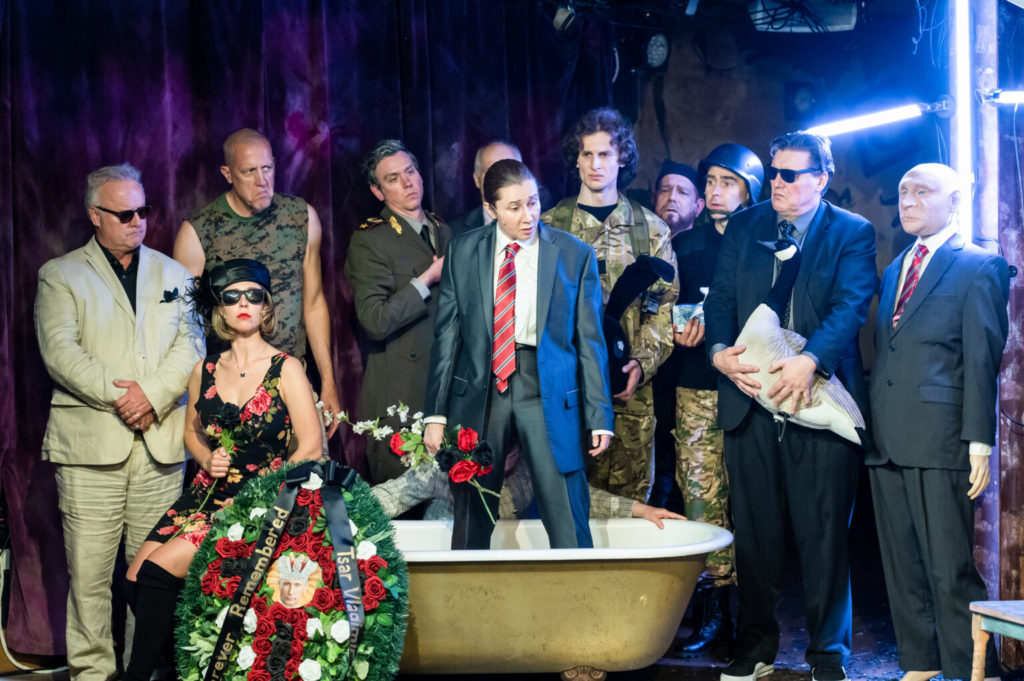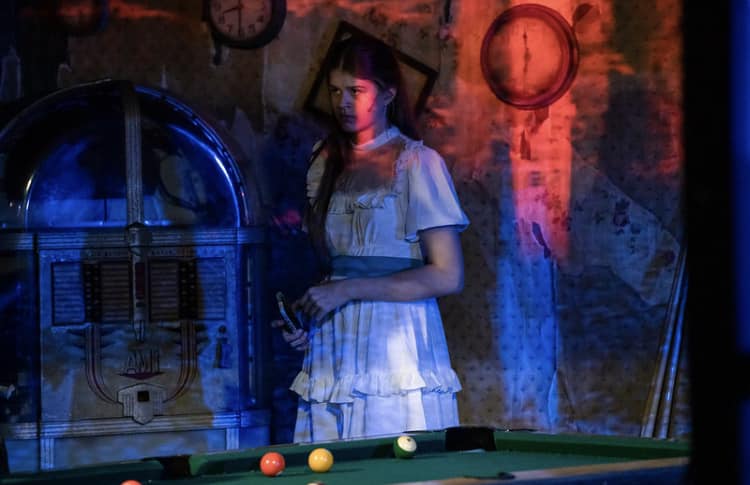
Photo via https://www.arlekinplayers.com/the-gaaga
Presented by Arlekin Players Theatre
Written and co-directed by Sasha Denisova
Co-Directed by Igor Golyak
Environmental Design by Irina Kruzhilinia
Produced by Sara Stackhouse
Featuring: Jeremy Beazlie, Boris Berdnikov, Irina Bordian, Daniel Boudreau, Jenya Brodskaia, Darya Denisova, Polina Dubovikova, Taisiia “Taya” Fedorenko, Anne Gottlieb, Dev Luthra, Robert Pemberton, Michael Sáenz, Garrett Sands, Julia Shikh, Misha Tyutyunik, Irina Vilenchik, Ilia Volok, Robert Walsh
June 2-18, 2023 | US Premiere
BEAT BREW HALL
13 Brattle St., Harvard Square
Live, In-Person June 2-18
Streaming live, online, June 8-18
Review by Maegan Bergeron-Clearwood
CAMBRIDGE, Mass. — Imagine a future in which not only dictators, but also their conspirators and allies and simpering cronies, are held actually held responsible for their crimes against humanity. Imagine a forum for truth-telling and accountability, where the perpetrators are subjected to mockery and the survivors are entitled to impart judgment, rather than the all-too-common other way around.
This is, of course, a topsy-turvy dream, so it is fitting that The Gaaga: a site specific phantasmagoria situates the absurd concept within the mind of a child. Its Alice in Wonderland-inspired protagonist, The Girl (played by 17-year-old Ukrainian refugee and artist Taisiia “Taya” Fedorenko), leads her audience of juror-witnesses through her fantasy world, in which she puts Vladimir Putin and his conspirators on trial for horrific crimes against her family and country.
Arlekin Players Theatre commissioned Ukrainian playwright-director Sasha Denisova to create The Gaaga, staged in Beat Brew Hall, a bar that closed during lockdown and is transformed by Irina Kruzhilinia’s immersive environmental design to be, simultaneously, an underground bunker, abandoned bar, and children’s nursery. Denisova’s play hybridizes two theatrical genres to strip Putin and the rest of the accused of their power: documentary testimony and political satire. It’s this combination that elevates The Gaaga from slapstick drag comedy to biting, change-making commentary.
Political figureheads are lampooned in a series of desperate and embarrassingly flimsy defense testimonies, most of which can be boiled down to “I was just following orders,” moderated by two imaginary attorneys. The play satirizes perhaps too many of Putin’s associates (eight, if I counted correctly), and the testimonial sequences sometimes drag, resulting in a two-and-a-half-hour production. The basement stage is appropriately dingy, but perhaps too-appropriately stuffy and cramped (I was practically sitting on my partner, the seats were so close together), making the play feel even longer.
But the play’s episodic structure is engaging, feeling less like a courtroom drama and more like a burlesque show: actors satirize one crony after another, using virtually every tool in the comedy toolbox – music, dance, slapstick, monologues, sketches, drag – to show these people as they truly are: desperate clowns. The play seems particularly interested in the ways that the accused parties weaponize gender to their corrupt ends, with Polina Dubovikova’s drag performance of Putin being a simultaneously goofy, terrifying, and spot-on standout.
But, the 18-person ensemble never lets its audience forget why these clowns are on trial. Many attempts at political satire employ caricature to such an extreme that the targeted figureheads appear toothless, using mockery for mockery’s sake rather than a tool for critique and condemnation. Here Putin and company are buffoons, yes, but buffoons with weapons, wealth, power, and choice. Everyone, from the tyrannical Putin all the way down to the hapless soldier, is held accountable.

Photo via https://www.arlekinplayers.com/the-gaaga
The Gaaga does not use fantasy to flinch away from a traumatic reality, but the very opposite – as The Girl leads us deeper and deeper into her internal Wonderland, we are presented an increasingly twisted glimpse into the impacts of war on the human psyche. The goofy trial scenes are interspersed with true accounts that Denisova collected from refugees, presented with grisly visual metaphors, like the smack of a billiard ball in place of a gunshot. It’s a stunning subversion of the Alice in Wonderland trope: The Girl is not a child on the cusp of adulthood, but a young person who has been forced to grow up far too quickly.
This journey into war-torn Wonderland eventually leads us to the central question of the play, which is not, as the attorneys attest, “Who is guilty?” or “How does one prove a genocide?” but rather, “Whose testimony matters?” The Gaaga is not about proof, but about truth and the sacred act of witnessing. The audience watches the trial, not only in front of us, but via live footage broadcast on various screens around the stage, as if daring us to look away.
The Girl, as witness to and survivor of a litany of atrocities, would never be taken seriously in a court of law. But The Gaaga gives her a platform for testimony, and the audience plays the role of juror, yes, but more importantly, affirmers of her truth. And in a reality in which the powerful are rarely, if ever, held accountable, these tools – telling, seeing, and affirming – are perhaps our greatest weapons in the pursuit of justice.
